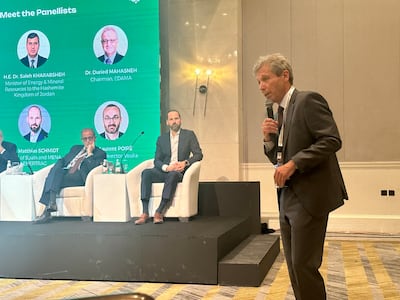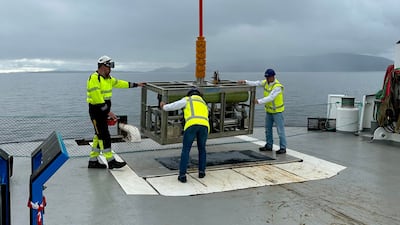Norwegian company Waterise has partnered with Jordan’s sole phosphate producer to construct and manage a desalination plant near the Red Sea city of Aqaba that aims to alleviate water scarcity in the parched kingdom, the company's chief executive said.
The initial agreement with the Jordan Phosphate Mines Company involves producing 18 million cubic metres of desalinated water annually for its main fertiliser plant. This would replace the predominantly fresh water sourced from a nearby aquifer, Niels Petter Wright told The National this week in an exclusive interview.
“Deep sea desalination is the best environmental solution by far,” he said, pointing out that a Waterise plant requires 40 per cent less energy, 85 per cent less land area and is quicker to build than conventional plants, significantly reducing environmental impact.
Waterise and JPMC are collaborating with the Jordanian authorities on the two-year project to meet the water demand and expansion plans of the phosphate producer, Mr Wright said.
Water from the project could also be available to other users in Aqaba, he said.
“Some of the details, such as getting permits and approvals, will occur later in the process,” he said on the sidelines of an EU-sponsored business forum, entitled Digital and Green Jordan, in Amman.

Waterise was at the forum to market sea technology, which, it says lessens the amount of coastal land needed for desalination, lowers the costs and complexity of the process, and minimises environmental effects.
Last year, Solar Water, a British company, signed an initial deal with JPMC to build and operate a desalination plant in Aqaba. However, the deal fell through due to disagreements over pricing, according to an executive familiar with the agreement.
“We have extremely competitive tariffs, because of the way we build and execute,” Mr Wright said, adding that JPMC will be responsible for supplying electricity to the plant, either through building a solar source or purchasing electricity from the grid.
Industry accounts for 3.3 per cent of the water consumption in Jordan, while agriculture uses 48.6 per cent and municipal consumption is at 47.5 per cent.
In a country of 10 million, rainfall is among the lowest on Earth. Illegal wells have accelerated the depletion of several aquifers and theft of municipal water is widespread, although the authorities say they have been clamping down.
The construction of a 300 million cubic metres per year desalination plant in Aqaba, with plans to transport the water to Amman, has encountered numerous setbacks.
These delays are primarily attributed to the insistence of international financiers on a significant decrease in water losses. Additionally, potential bidders have expressed reservations regarding the project's profitability.
During the EU business forum, Mr Wright was among the participants who urged the Jordanian government to remove restrictions that are hindering the private sector's ability to address the country's water shortages.
They emphasised the importance of shifting focus from centrally planned mega projects to allow for more involvement from the private sector.
JPMC has a monopoly in the phosphate production industry in Jordan since its establishment as a state-owned entity in the early 1950s.
Currently, the majority ownership of JPMC lies with the governments of Jordan, Kuwait, and India.
JPMC's shares last closed unchanged at 11.23 Jordanian dinars ($15.84) on the Amman Stock Exchange. The stock has remained stable this year but it has declined significantly from 2023 levels.
JPMC’s chairman Mohammad Thneibat said in a statement that Waterise's “innovative desalination solution” would minimise the “ecological footprint” of his company.
In 2022, JPMC exported $1.3 billion worth of phosphate, representing nine per cent of Jordan's total exports.







